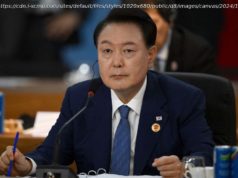Kennedy gave a young applicant for a clerkship the benefit of the doubt. That optimism was reflected in his legal opinions, too.
“What do you think of New York Times v. Sullivan ?” Justice Anthony Kennedy asked me only a few minutes into my clerkship interview with him.
Just getting the interview seemed itself a tremendous accomplishment. Most other Justices selected potential clerks and brought them in straightaway for interviews. Justice Kennedy, by contrast, put clerkship candidates through two rounds of screening interviews with former law clerks. Only when the screeners had approved a candidate could he or she advance to an interview with the Justice himself.
Thus, by the time I sat in Justice Kennedy’s office in December 1994, I had already endured lengthy interviews with then-Ninth-Circuit judge Alex Kozinski and then-Assistant US Attorney Harry Litman, and I was hoping that the interview with the Justice himself would be blessedly straightforward.
My heart sank, therefore, when the Justice asked me about New York Times v. Sullivan — because I didn’t know the first thing about the case. For a split second, I thought about trying to feign some knowledge, but realizing that doing so would be both dishonest and futile, I said simply “I really don’t have an opinion because I haven’t studied the First Amendment in any detail.” Fully aware of the extraordinary value that Justice Kennedy’s placed on the First Amendment, I naturally expected this one answer to derail my hopes for a Supreme Court clerkship.
However, Justice Kennedy simply said, “You have time to learn,” and he went on to ask me my thoughts on Planned Parenthood v. Casey, a case about which I could knowledgeably opine.
Although I was subsequently shocked when Justice Kennedy offered me a clerkship despite my First Amendment gaffe, I learned during the year I spent clerking for him taught me that this generosity of spirit was very characteristic of his approach to life, and to the law. Kennedy’s jurisprudence — along with his speeches, personal interactions, and even clerkship hiring practices — reveal two fundamental characteristics of the man who may well be the most significant Supreme Court Justice of the last generation.
The first is his profound optimism. We see that optimism in all of his most important opinions — and indeed in the soaring (some say overly flowery) language of those opinions. Optimism animates opinions of his that revered on the right, such as Citizens United, where Justice Kennedy famously — and perhaps misguidedly — argued that “the appearance of influence or access … will not cause the electorate to lose faith in our democracy.”
And such optimism equally characterizes opinions venerated by the left, such as Romer v. Evans, in which Justice Kennedy’s opinion invalidated Colorado’s effort to exclude gays and lesbians from protection of anti-discrimination laws. There, Justice Kennedy admonished those who sought that policy goal,and his dissenting colleagues, with these words: “It is not within our constitutional tradition to enact laws of this sort. Central both to the idea of the rule of law and to our own Constitution’s guarantee of equal protection is the principle that government and each of its parts remain open on impartial terms to all who seek its assistance.”
Justice Kennedy’s optimism is sometimes lauded as inspirational and other times derided as naïve, but however factually grounded it may be, it is, I am certain, utterly sincere. Justice Kennedy believes in the ideals upon which this nation was founded. Justice Kennedy believes in the principles that are embodied in our Constitution and in our democratic form of government. He gives the system, and the citizenry, the benefit of the doubt.
And Justice Kennedy is profoundly optimistic about the role that the Supreme Court can play in preserving those ideals and strengthening our democratic principles. That particular flavor of optimism pervades Planned Parenthood v. Casey, where Justices Kennedy, O’Connor and Souter justify their refusal to overrule Roe v. Wade in part as a consequence of the irreparable harm that the Court might suffer if it were to be seen to be overruling long-standing precedent without “any justification beyond a present doctrinal disposition to come out differently from the Court of 1973.”
Are Justice Kennedy’s views naïve? Perhaps. Idealistic? Probably. But they unquestionably stem from an overarching belief in the fundamental goodness of the United States and its people.
Although he tends to assume the best about citizens and institutions, he is no Pangloss. Justice Kennedy’s jurisprudence also reveals both his recognition and acceptance of messiness of our country, its laws, culture and political traditions. Throughout his more than three decades on the Court, Justice Kennedy has been criticized — sometimes virulently — for alleged inconsistencies in his opinions and for lacking a clear vision of the Constitution and a coherent interpretative method.
To be sure, Justice Kennedy’s views have been less predictable than those of many of his colleagues. And unlike the late Justice Scalia, he did not pledge devotion to, and advocate, a single interpretive method (originalism, in Scalia’s case). Likewise, skillful commentators and academics have been able to identify statements, holdings and interpretive methods that seemed irreconcilably inconsistent.
But I believe that what may seem like inconsistencies are better explained as Justice Kennedy’s effort to preserve and promote the fundamental values of American society amid the messy, factually diverse, context-specific world in which we actually live. He believed in a kind of realism that accepted that the kind of abstract values that most of us first learn in high-school civics class necessarily play out differently in different cases.
Many have highlighted, for instance, Justice Kennedy’s commitment to the protection of liberty and human dignity. Protecting those values will necessarily generate inconsistencies because those values are implicated in different ways in cases concerning affirmative action than in cases concerning reproductive rights or Fourth Amendment search and seizure. Moreover, the very same fundamental values that Justice Kennedy has dedicated his career to preserving frequently conflict in individual cases.
Concededly, some jurists employ a more structured (some might say rigid) framework for deciding cases that feature conflict between valuable principles; Justice Kennedy’s decision-making process is more fluid. But it is also more attuned, I would suggest, to factual differences between cases and the impact of decisions on litigants and the wider society.
Certainly, many of those who lauded Justice Kennedy for his commitment to dignity and liberty when the litigants were juveniles facing the death penalty or Guantanamo detainees seeking habeas corpus found it difficult to understand his refusal to rule in favor of gay couples seeking wedding cakes or Muslims seeking to enter the U.
Start
United States
USA — Criminal An optimist and yet a realist: a former clerk to Justice Kennedy...






